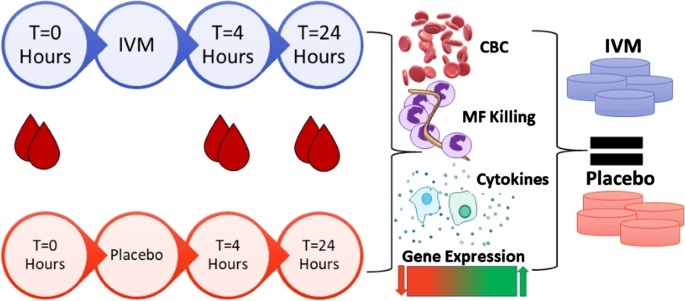Lack of detectable short-term effects of a single dose of ivermectin on the human immune system

Background: Ivermectin is widely used in human and animal medicine to treat and prevent parasite nematode infections. It has been suggested that its mode of action requires the host immune system, as it is difficult to reproduce its clinical efficacy in vitro. We therefore studied the effects of a single dose of ivermectin (Stromectol®-0.15 mg/kg) on cytokine levels and immune cell gene expression in human volunteers. This dose reduces bloodstream microfilariae rapidly and for several months when given in mass drug administration programmes.
Methods: Healthy volunteers with no travel history to endemic regions were given 3-4 tablets, depending on their weight, of either ivermectin or a placebo. Blood samples were drawn immediately prior to administration, 4 h and 24 h afterwards, and complete blood counts performed. Serum levels of 41 cytokines and chemokines were measured using Luminex® and expression levels of 770 myeloid-cell-related genes determined using the NanoString nCounter®. Cytokine levels at 4 h and 24 h post-treatment were compared to the levels pre-treatment using simple t tests to determine if any individual results required further investigation, taking p = < 0.05 as the level of significance. NanoString data were analysed on the proprietary software, nSolver™.
Results: No significant differences were observed in complete blood counts or cytokine levels at either time point between people given ivermectin versus placebo. Only three genes showed a significant change in expression in peripheral blood mononuclear cells 4 h after ivermectin was given; there were no significant changes 24 h after drug administration or in polymorphonuclear cells at either time point. Leukocytes isolated from those participants given ivermectin showed no difference in their ability to kill Brugia malayi microfilariae in vitro.
Conclusions: Overall, our data do not support a direct effect of ivermectin, when given at the dose used in current filarial elimination programmes, on the human immune system. Trial registration ClinicalTrials.gov NCT03459794 Registered 9th March 2018, Retrospectively registered https://clinicaltrials.gov/ct2/show/NCT03459794?term=NCT03459794&draw=2&rank=1 .
Natalie E Wilson, Barbara J Reaves, Adrian J Wolstenholme. Parasit Vectors. 2021 Jun 5;14(1):304. doi: 10.1186/s13071-021-04810-6.
